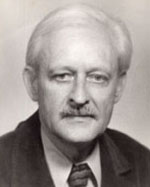|
|
 |
 |
 |
 |
|
OBITUARIESJohn Hine Mundy '40, Celebrated Medievalist
Professor of History Emeritus John Hine Mundy '40, a member of the faculty for 40 years and an internationally lauded medievalist, died on April 13. He was 86. Mundy was born on December 29, 1917, in London. In 1921, the family emigrated to the United States. Mundy was educated at the St. Thomas School in midtown and the Trinity School. After graduating from the College, he earned a master's from Columbia in 1941. He married Charlotte Williams, a Columbia graduate student from Oshkosh, Wis., in 1942. Mundy served in the U.S. Army from 1943-45 and then resumed his studies at Columbia. In a 1985 appreciation, Shepherd Professor of History Emeritus Eugene Rice, who was a member of Mundy's Army unit, remembered the young historian as "extravagantly articulate (in the English accent taught him at home), exotic, elegant and radical in idea and gesture, full of wit and gaiety, irrepressibly shocking to provincial pieties." In 1946, Mundy returned to France to research the Cathars, a medieval heretical sect, of Toulouse, a city that would preoccupy him for the rest of his scholarly life. Looking back in 1997, Mundy noted that "research conditions were ideal for a student whose means barely sufficed to support him abroad for less than a year." Armed with a borrowed camera and a supply of war-surplus film, Mundy swapped his photographic services for access to documents in archives in Toulouse and Paris. Mundy earned his doctorate from Columbia in 1950 and published his dissertation as Liberty and Political Power in Toulouse, 1050-1230 (New York, 1954). After a brief respite to pursue other topics, Mundy resumed his study of Toulouse in the 1960s, publishing articles on the city's university, hospitals, municipal brothels, monasteries, public charity, heretics, monks and families. His other books on Toulouse include The Repression of Catharism at Toulouse: The Royal Diploma of 1279 (Toronto, 1985), Men and Women at Toulouse in the Age of the Cathars (Toronto, 1990) and Society and Government at Toulouse in the Age of the Cathars (Toronto, 1997). Mundy joined the faculty as an instructor in 1947, became an assistant professor in 1950, an associate professor in 1956 and full professor in 1962. He served as chairman of the history department from 1967-70. He also taught at Barnard, the New School University, the University of Chicago, Fordham and Brown. Fluent in French, German and Latin, Mundy was highly regarded for his technical expertise. He regularly trained graduate students in paleography and diplomatics and encouraged the close reading of original documents. His only textbook, Europe in the High Middle Ages, 1150-1230 (New York, 1973), still in print, is notable for its reliance on original sources. Mundy was a recognized authority on many aspects of medieval life. In 1958, he contributed the historical essay to The Medieval Town (Princeton, 1958), and he lectured on medieval urbanism at the Metropolitan Museum of Art. For many years, he taught a popular course on the preindustrial European city. He wrote essays on conciliarism, the medieval church and religious life and taught a course on medieval political and ecclesiological thought. Mundy edited and contributed to Essays in Medieval Life and Thought Presented in Honor of A.P. Evans (New York, 1955) and contributed to Chapters in Western Civilization and the Columbia History of the World (New York, 1972). In the decade before retirement, when some professors abandon teaching undergraduates, Mundy filled Fayerweather Hall's largest lecture room with first-years and sophomores for two introductory modern European history courses. He stayed busy after his retirement in 1987, publishing two monographs on Toulouse. His last book is scheduled for publication in England later this year. Mundy received a Fulbright fellowship as well as fellowships from the American Council of Learned Societies (twice), the Guggenheim Foundation (twice) and the National Endowment for the Humanities. He twice was a visiting member of the Institute of Advanced Study at Princeton. He was a fellow of the American Academy of Arts and Sciences. He became a fellow of the Medieval Academy of America in 1975, and served as its president in 1988-89. In 1981, he was elected to the American Academy of Arts and Sciences. In addition to his wife, Mundy is survived by a son, John; daughter, Martha; sister, Meg; two granddaughters and a nephew. Memorial contributions may be made to The Rare Book and Manuscript Library, 535 W. 114th St., Columbia University, New York, NY 10027. Timothy P. Cross
|
|
||||||||||||||||||||||||||||||||||||||||||||||||||||||
